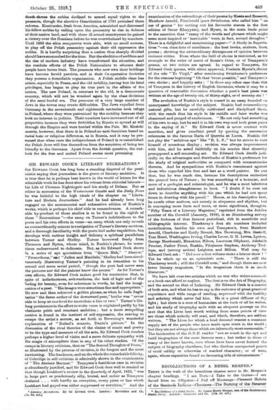RECOLLECTIONS OF A REBEL REEFER.• Team is the waft of
the breathless cinema actor in Mr. Morgan's chapter headings. " I am Born—I Take to the Gutter—I am Saved from an Alligator—I Fall of! Mustangs—Pleasant Habit/ of the Seminole Indians---Choctaws--The Burning of the Steamer • Recolledieas of a Reba Ruler. By James Morris MO 11/11, late of the Confederate States Navy. London : Constable and Co. 110s. ed. net.] 'Princess '—Charloe, the Negro Horse Doctor, Teaches me Trick Riding." That is pretty well for the infantile exordium of an adventurer, born in New Orleans in 1845 ; and the book does not belie this early promise. Master Morgan goes very young to the historical frigate Constitution ' (Old Ironsides), naval school ship in the Severn River near Annapolis. Before he is sixteen ho has seen his elder brother killed in a duel, a duel of the Southern un- equivocal type, fought with double-barrel shotguns loaded with ball, at twenty paces, and has helped to take the body home to his father. One brother was Judge Morgan of New Orleans, whose friends included Mr. Bouligny, recently member of Congress, and probably the moat famous duellist in the State, and Mr. Heriat, the fighting editor of the Bee, the paper which never apologized." Master Morgan was born at a prosperous time for adventure. He saw service in the McRae,' which was afterwards in the thick of the fighting against Admiral Farragut at New Orleans. The 'McRae' " was the only thing afloat with the Confederate flag still flying when day broke."
The Confederate Navy made some remarkable experiments in ironclads. The Louisiana ' was a square box, divided aft into two hulls, with two paddle-wheels shipped between, the smaller in front, " so as to insure the larger one working in a mill race when both were turning at the same time." This device was as successful as one might expect. " Going downstream it was with difficulty that the ' Louisiana ' kept up with the current, and when pointed upstream she was carried down at the rate of two or three knots an hour." So she became " an additional fort." Young Morgan, after a bout of yellow fever at Charleston, began blockade- running from that port under Commodore Maury in 1862. In the Bermudas he found crowds of reckless sea-dogs, whom the war had raised from seventy dollars a month to ten thousand dollars for the round trip, besides trading profits. A good deal of this money went in champagne ; and the skippers amused themselves by sitting in a hotel window with bags of shillings to throw to the loafing negroes in the street. " It is a singular fact," says Mr. Morgan, drily, " that after the war not one of these men had a dollar to bless himself with." Later he went to England, and after some delay left unobtrusively in the sea-going tug Alan' She met off Ushant the Dumbarton-built Japan,' which, after some hours of strenuous labour at gun-shifting, hoisted Maury's pendant, he formally declaring that she was now the Confederate cruiser ' Georgia.' She was only 535 tons, and had a long, hazardous, and adventurous voyage westward, under any convenient colours. She burned the Yankee ' Dictator,' after taking off her crew. She burned the Good Hope,' of Boston, whose captain, dying some time before, had been conscientiously pickled by the steward, because the captain's son could not bear to have his father buried at sea. Then the 'U.S. barque 'J. W. Seaver' came up, drawn by the flare of the burning Good Hope,' to rescue those perishing in deep waters. Her skipper, who had been at sea since before the war, and had never heard of it, indignantly asked Maury if he was a pirate. Maury showed he was not, by sparing the enemy cargo of a ship " which had come on an errand of mercy to help fellow. seamen in distress," and giving her stores enough to reach port.
Mr. Morgan, who became a widower at the age of twenty-one, was one of the ten Northern and ten Southern officers who, following General Sherman to Egypt, obtained commissions in the Khedive's Army in 1869. There he rose to the rank of Lieutenant-Colonel. Ho relates, with great enjoyment, how the Khedive once telegraphed to the Rothschilds to send out Dille. Schneider, a famous light opera singer, and how the Rothschilds, through a pardonable error, sent him an elderly financier of the same name. " In the name of the Prophet, what are you doing here ? " said the Khedive. " God only knows," said old Schneider.
Mr. Morgan has produced a consistently readable and racy account of many years stuffed with vivid adventure and quaint experiences. He is justifiably proud of the fact that on June 30th, 1914, at the graves of the Confederate dead in Winchester, Virginia, he lifted up his voice against " our deluded peace-at-any-price people," and " the American braggarts who maintain that no preparation for war is necessary." That called for some of the courage learned as a " Rub. Reefer."



































 Previous page
Previous page